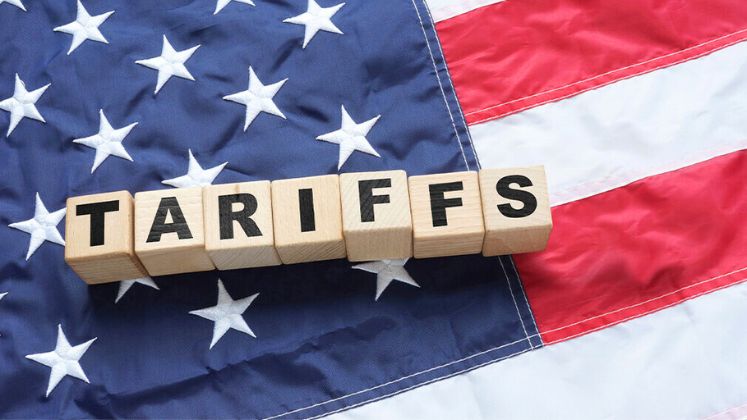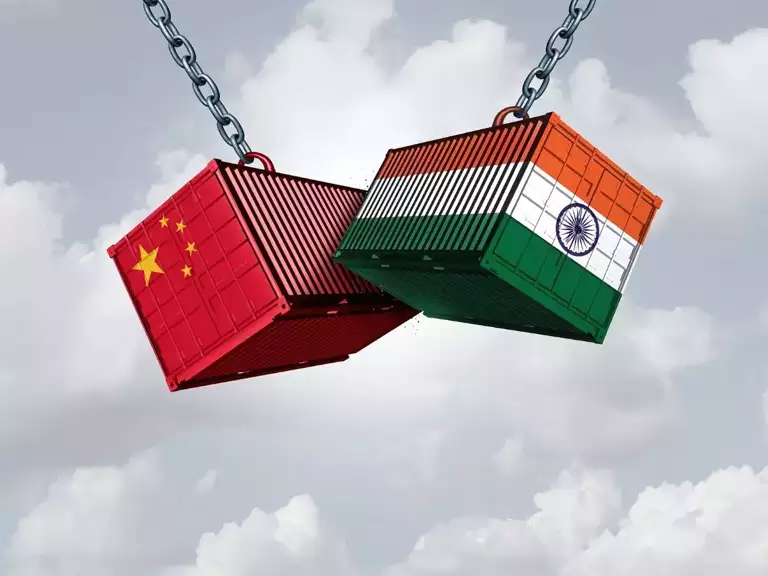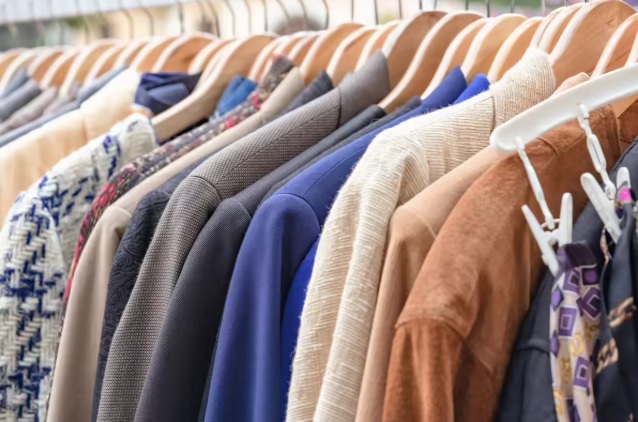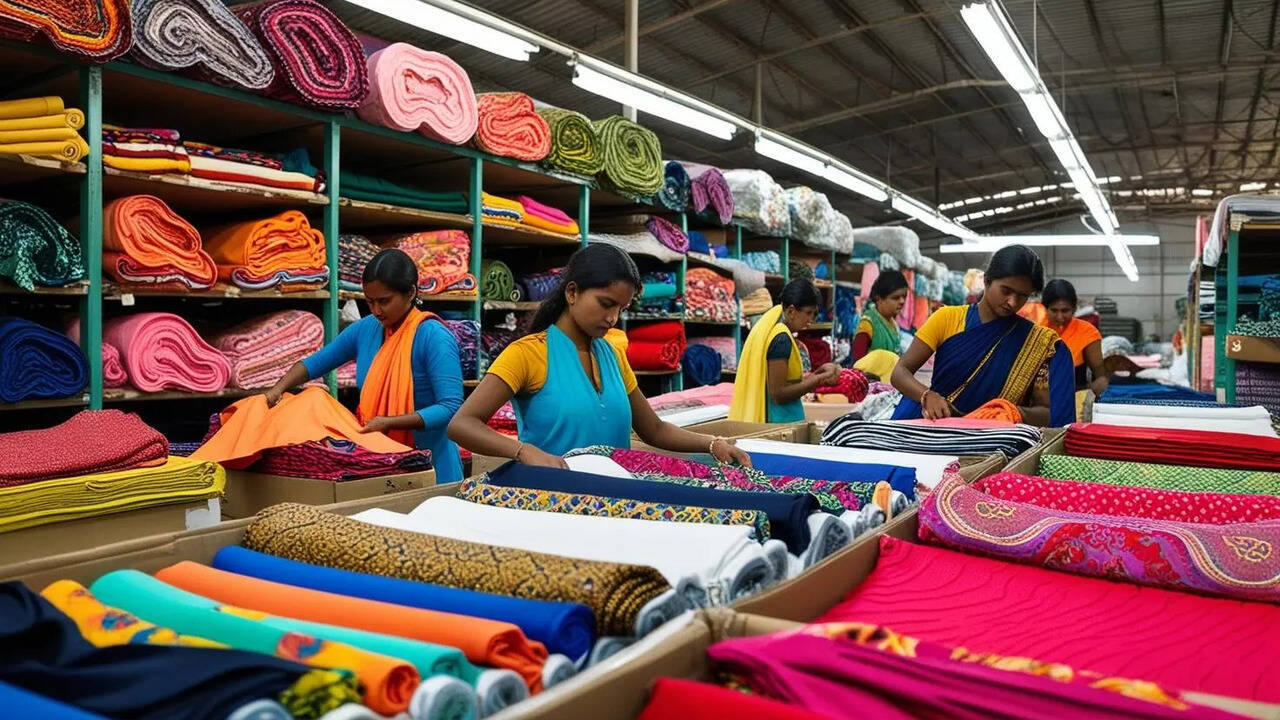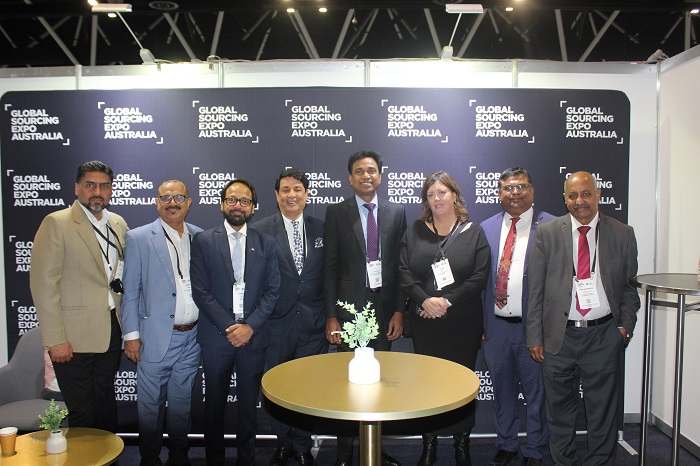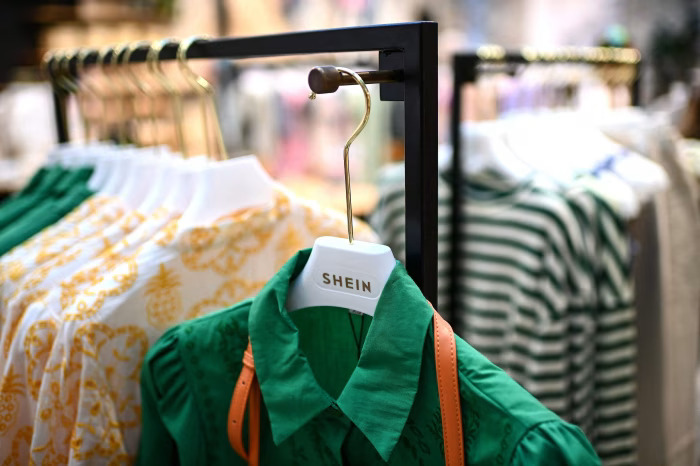FW
Luxury linens and bedding brand Parachute has announced a significant strategic shift. Unlike mass-market chains such as the now-defunct Bed Bath & Beyond or Linens and Things, the brand has decided to drastically reduce its retail footprint. According to a report from RetailDive, the company is closing 19 of its locations, leaving just seven remaining open. This move signals a pivot towards strengthening its wholesale relationships and focusing more on its website.
A key part of this revised strategy involves deepening ties with partners like Target. Earlier this year, Parachute launched an exclusive collection with the mass-market retail giant, a deal Target heavily promoted before its April debut. The collaboration offered over 200 bedding and bath linens, with most items priced under $90, aiming to deliver ‘cloud-like’ luxury at a value point unique to Target.
Parachute also maintains distribution through Nordstrom and previously partnered with Crate and Barrel, indicating a growing emphasis on broader retail presence through alliances rather than standalone stores. This strategic pivot highlights the ongoing evolution in retail as brands seek efficient ways to reach customers while managing the costs of physical presence.
Premium home décor and furnishings brand from Sutlej Textiles & Industries, a KK Birla Group company, Nesterra officially launched its highly anticipated ‘5.0 Collection’ in Mumbai. A significant moment for Nesterra, this launch highlights an evolution in aesthetics, functionality, and sustainability, all while reaffirming its ‘consumer-first’ philosophy.
The exclusive event attracted curated network of retailers, design professionals, and industry experts. Attendees had the opportunity to explore the meticulously crafted collection, engage in insightful conversations, and experience the fabrics firsthand. The evening culminated with a dinner and cocktail reception, fostering further connections within the design and retail community.
Ashish Kumar, CEO and Wholetime Director, Nesterra, states, celebrating craft, connection and conscience, the brand’s new collection reflects the maturity of its design philosophy, the strength of its retail partners, and the clarity of its direction. The strength of their retail partnerships is crucial to the brand's success, emphasizes Kumar. Marking a key milestone in Nesterra's product portfolio expansion and setting the stage for future growth, both domestically and internationally, the brand launched a new category of blinds this season
Significantly expanding Nesterra's creative and functional offerings, the ‘5.0 Collection’ introduces a distinct range of blinds, designed for modern homes. The fabric range includes the Flawless range of easy-clean upholstery, the light-controlling Eclipse blackout curtains, and the delicate Breeze sheers, blending everyday utility with refined aesthetics. Collections like ‘Garden of 1905’ revive intricate Flemish botanical motifs from original 1905 gouache artworks, while ‘Raw Comfort,’ ‘Twilight,’ and ‘Petal Poetry’ add tactile warmth, subtle luxury, and handcrafted charm to interiors.
Complementing the fabrics, the new blinds category features ‘Forest Frames’ (wooden blinds), ‘Layor’ (roller blinds), and ‘Shades of Blinds’ offering versatile blackout, translucent, and sheer options. These curated offerings underscore Nesterra's dedication to mindful living, design-driven storytelling, and a seamless blend of form and function.
Every collection launch reflects years of listening, observing, reflecting, and perfecting the art of dressing homes to feature the brand’s consumer's personality, reiterates Smita Joshi, Vice President, Nesterra. With its easy-care fabrics, energy-saving solutions, light-filtering drapery, and first-ever blinds range, the ‘5.0 Collection,’ is designed to be refreshing, purposeful, and relevant, embodying the philosophy that ‘less is more,’ she adds.
Each collection within the ‘5.0’ launch showcases Nesterra’s design evolution, where aesthetics meet purpose and every thread tells a story. With a strong focus on user-driven innovation and expanded categories, this new range solidifies Nesterra’s vision of transforming every home into a personal canvas of comfort, beauty, and functionality.
Pakistan could meet the increasing demands of its recycling industry by importing textile waste from Bangladesh, affirmed Mahmud Hasan Khan Babu, President, BGMEA.
Highlighting Bangladesh's position as the world's largest producer of jute, Khan Babu notes, there is a significant demand for Bangladeshi jute fiber in Pakistan and it the country Pakistan imports jute fiber, it will be beneficial for both countries.
These remarks were made during a courtesy visit by Muhammad Wasif, Chargé d'Affaires, Pakistan High Commission, to the BGMEA office. Also including Zain Aziza, Attache, Trade and Investment and several BGMEA Vice-Presidents and Directors, the meeting focused on strengthening and expanding trade ties between Bangladesh and Pakistan, particularly within the garment and textile sectors, and explored other potential areas of cooperation.
Discussions included increasing textile imports from Pakistan and exporting ready-made garments and accessories from Bangladesh to Pakistan. Bangladesh has made notable progress in garment accessories production, a BGMEA press release indicated.
Both sides agreed to share knowledge, send business delegations, and collaborate on exhibitions and workshops. They also discussed implementing an MoU previously signed between the BGMEA and the Pakistan Readymade Garments Manufacturers and Exporters Association (PRGMEA) to promote bilateral trade.
Active involvement from business communities in both countries is vital for the MoU's successful implementation, emphasized Khan Babu. Both parties decided to appoint focal points to further accelerate trade and investment cooperation.
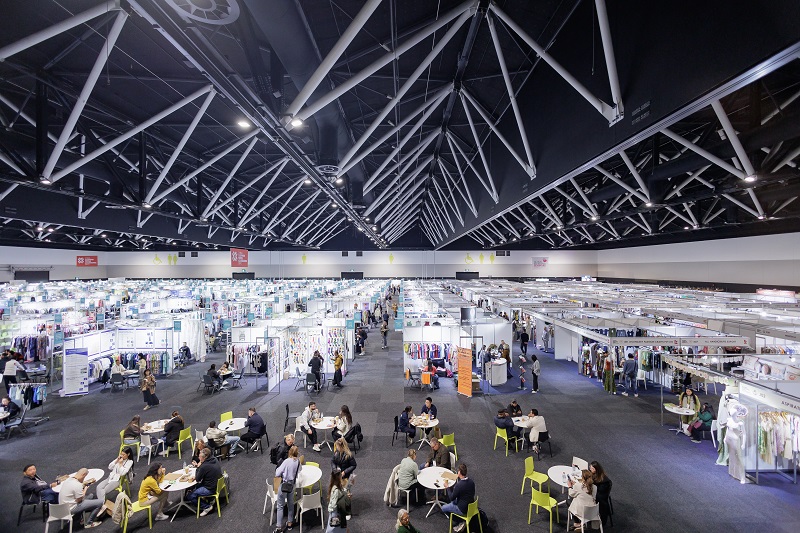
The Global Sourcing Expo, a pivotal event connecting global suppliers with Australian trade buyers, continues to solidify its position as a leading platform for business, industry associations, and export councils. With successful editions recently concluding in Sydney (June 17-19, 2025) and the highly anticipated Melbourne show approaching, the expo is increasingly becoming a strategic center for sourcing, fostering innovation, sustainability, and robust international partnerships across the Asia-Pacific region.
Sydney's resounding success and evolving buyer landscape
The third edition of Global Sourcing Expo in Sydney, held recently, wrapped up on a high note, demonstrating significant growth and an evolving buyer landscape. Julie Holt, Global Business and Exhibition Director for Global Sourcing Expo, expressed her enthusiasm: "We were thrilled with the success of the third edition of Global Sourcing Expo Sydney. The event gained strong momentum in the lead-up, with impressive pre-registration figures and attendance from high-quality, target buyers." The Sydney edition saw our visitor attendance numbers draw a record 5,434 unique visitors to the International Convention Centre, representing a 22% increase in unique visits and 26% overall, compared to the previous year, whereas in 2024 the event in Sydney built on a remarkable 43% growth from its inaugural 2023 event. This underscores the expo's strong resonance within the Sydney market. This milestone reflects the Expo’s expanding influence in the apparel, textiles, accessories, footwear and homeware sectors. While 5,434 unique attendees frequented the Expo over three-days, 1,044 returned on separate occasions, underpinning an appetite for further networking, learning and sourcing opportunities over the course of the show.
A notable trend observed in Sydney was the rise in start-up attendance, reflecting the city's entrepreneurial spirit. Buyers at the Sydney show exhibited a cautious optimism for 2025, showing keen interest in sustainability, innovation, and supply chain resilience. They actively sought partnerships that could deliver both product innovation and value, with a clear shift towards more agile and ethical sourcing. This included a preference for suppliers offering flexible order quantities, short lead times, and eco-conscious manufacturing.
Embracing innovation and sustainable sourcing
Sydney's buyers, particularly in apparel, demonstrated a strong inclination towards "purposeful innovation," seeking partners who could provide smart, differentiated solutions beyond just products. Interest in sustainable fashion and the circular economy continues to be a key feature, alongside an expanding focus on Smart & Functional Textiles, especially for sportswear and wellness apparel. The growing appetite for antibacterial, moisture-wicking, and temperature-regulating materials highlights a demand for advanced textile solutions.
A global showcase of sourcing excellence
The Global Sourcing Expo Sydney 2025 hosted an even more internationally diverse group of exhibitors this year, with participation from over 15 countries promised. The Expo saw 542 exhibitors from 17 countries including India, Nepal, Vietnam, Türkiye and Indonesia in attendance. This commitment aims to surpass previous attendance figures, reflecting the event's growing influence and appeal among Australian and global buyers.
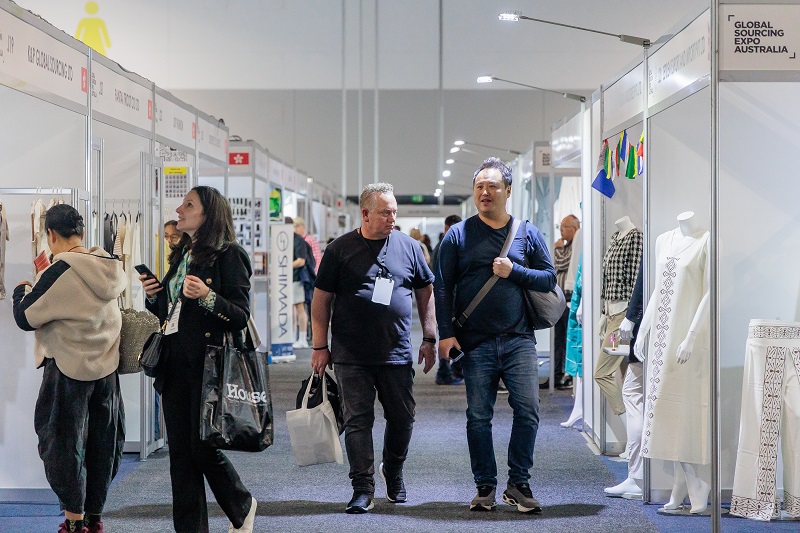
India marks a strong presence
India continued to be a foundational partner, with a dynamic presence at both Sydney and Melbourne editions of the Expo for over a decade. India's participation was strongly supported by the Federation of Export Organisations and The Wool and Woollens Export Promotion Council, showcasing the country's diverse offerings in textiles and related industries.
Rajesh Behl, MD, Seam Consulting Group, who is helping launch a knitwear brand made from recycled fibers for a South Indian company, emphasized India's unique position. "India definitely enjoys a special position and niche in fashion, apparel, and textiles in Australia and the region’s sourcing," Behl commented, adding a crucial point for Indian exhibitors: "Indian exhibitors have to realize that the market here is not voluminous as in USA and EU. Indians should be willing to work on smaller volumes and grow gradually."
The Consulate General of India in Sydney, represented by Sudip Bhattacharya, Trade & Investment Promotion Officer, along with Suneet Jain, CA, Head of Professional Events, Australian (Sydney) Chapter of The Institute of Chartered Accountants of India, and Irfan Malik, National Associate at Australia India Business Council (AIBC), have all been instrumental in guiding Indian exhibitors.
With around 29 exhibitors, Indian participants expressed satisfactory responses from the Sydney exhibition, though some noted that Melbourne tends to attract more directly relevant buyers for their products.
China and other participating countries showcase wide product range
China, a dominant player, showcased a wide range of products. Eric Shen, Sales Director at Shanghai HollyTex Textile Co Ltd, which manufactures wool and wool-based suiting fabrics, expressed a positive outlook, stating, "We found the Australian buyers quite receptive to our offerings and see great potential in this market." Holly, Sales Manager, Holly Textiles and Sunny Li, Sales Manager at Changzhou Dahua Import and Export (Group) Co Ltd, echoed similar sentiments, emphasizing the promising interactions. Andrew Zhang, Founder of Shenzhen Misi Garments Co Ltd, an underwear manufacturing company also known for Period Panties, found the show highly satisfactory for expanding into the Australian market. Tony from Cross Cargo, a Chinese apparel manufacturing company with local operations in Sydney, noted the successful engagement with buyers.
The strategic co-location of the Global Sourcing Expo Sydney with the China Clothing Textiles Accessories Expo further enhances the experience for buyers, offering an expanded showcase of high-quality products from China.
Vietnam's growing presence was also evident. Tracy Ng, Sales Director at Winnitex Group, Hong Kong, highlighted the increasing interest in Vietnamese manufacturers among Australian buyers, stating, "Our exclusive agent in Vietnam has reported significant buyer interest, reinforcing the increasing presence of Vietnamese manufacturers in the Australian market."
Bangladesh also had a significant showing. Rony Chakma, Commercial Counsellor at the Bangladesh High Commission in Canberra, Australia, along with Trafdar Sohel Rahman, Deputy Secretary of the Export Promotion Bureau, Bangladesh, spearheaded the participation of 10 Bangladeshi companies. Eight garment manufacturers and suppliers, financially supported by the Export Promotion Bureau, showcased ready-made garments, while two other apparel companies participated independently. Bangladesh's High Commissioner to Australia, FM Borhan Uddin, formally inaugurated the Bangladesh Pavilion.
Currently, around 93 percent of Bangladeshi exports to Australia consist of ready-made garments, making Bangladesh Australia’s 23rd largest trading partner. Rony Chakma noted the positive engagement, stating, "The participation of Bangladeshi companies has been highly satisfactory, allowing us to strengthen existing relationships and forge new ones within the Australian market."
For the first time, Nepal participated as an association, bringing 9 exhibitors. Most of these exhibitors, accustomed to exporting to EU and the US markets for their traditional products, expressed keen interest in understanding and entering the Australian market through this show. Pashupati Dev Pandey, President of the Garment Association, Nepal, highlighted the positive initial interactions. Sandeep Poudel of Legendary Fashion Craft Pvt Ltd, Nepal, and Sonam Muktan, Marketing & Communication at Logo Fashion Industry, Kathmandu, Nepal, a local brand also involved in mainstream apparel exports to EU & USA, found the Australian market receptive to their unique offerings.
Oguz Polat of Istanbul Authentic Bazaar, Australia, representing Turkish Cotton Towels, Rugs, and homewares, expressed satisfaction with the business generated in Australia, affirming the expo's value for a diverse range of products.
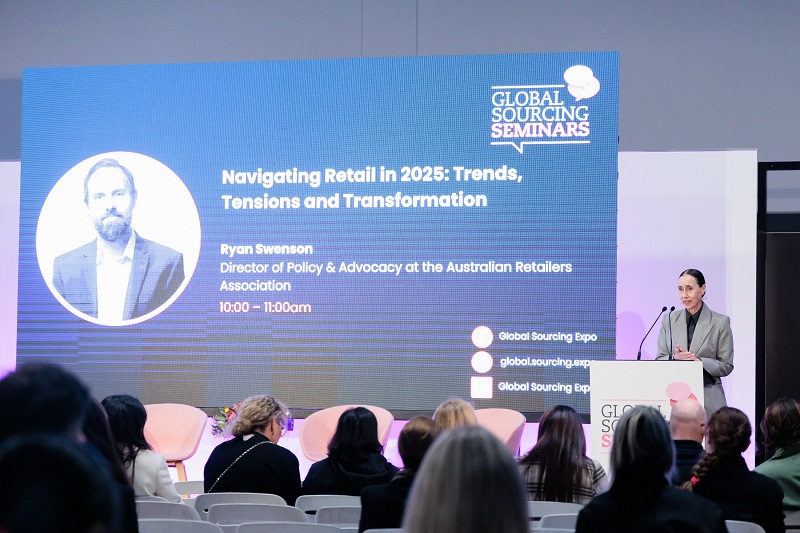
Engaging seminars and industry dialogue
A key highlight of the Global Sourcing Expo Sydney was the comprehensive Global Sourcing Seminars program, expertly MCed by Patty Huntington, Features and Fashion News Director of Harper's BAZAAR Australia. The three-day programme offered invaluable insights into the evolving retail and sourcing landscape.
On the inaugural day, sessions included "Navigating Retail in 2025: Trends, Tensions and Transformation" by Ryan Swenson of the Australian Retailers Association, and "Ecommerce with Purpose: Turning Online Sales into a Platform for Giving Back" presented by Olivia Carr of SHHH SILK. Bridget Veals from David Jones provided a "Top Buyer’s Bird’s Eye View on the Season" for Fall 2025 trends, followed by Dr. Rachel Lamarche-Beauchesne discussing "How to communicate sustainability to consumers."
Sessions on the second day featured Jenn Donovan on "Future-Ready Marketing: Using AI to Boost Business," and a panel discussion on "The Unstoppable Rise of B Corp" with Annemarie Seirrugia, Jessica Lacoma, and Justine O'Byrne. Therese Tarlinton delved into "How Suppliers and Retailers Can Win Together," and Neale O'Connor explored "Navigating the New Sourcing Landscape: Field Lessons from Asia’s Manufacturing Evolution."
The seminars concluded with sessions on the third day on "Sustainability: Your Secret Weapon for Cost Reduction & Market Leadership" by Anaita Sarkar of Hero Packaging, and "From Waste to Worth: Turning Textile Waste into Opportunity" moderated by Belinda Chellingworth. Robert Lockyer of Delta Global offered insights into "The Sustainable Packaging Revolution." These seminars underscored the expo's commitment to providing both education and fostering industry dialogue, crucial elements for effective sourcing practice.
Diverse and noted buyers visit the event
The Global Sourcing Expo attracted a much higher number and a wide array of visitors and buyers, reflecting its importance as a central hub for the industry. The event drew a significant number of key players from the Australian market. A snapshot of registered companies reveals a diverse mix of prominent retailers, fashion brands, and emerging businesses. Holt says, “Of those in attendance, majority held senior leadership roles as directors, co-founders, CEOs, creative directors, managers and buyers; with more than 70% in charge of final decision making.” Attendees from the likes of well-known names such as Adidas, Aje, ALDI, Amazon, bassike, Bed Threads, BIGW, BOODY, bras.n.things, Budgy smuggler, BY JOHNNY., C&M CAMILLA AND MARC, culture kings, FOREVER NEW, FURLA, Hanes, INDUSTRIE, KOJA, MESHKI, MIMCO, Muscle Republic, NUDELUCY, Piping Hot, REBECCA VALLANCE, rebel, RUNAWAY, SEAFFOLY Australia, SHEIKE, THE ICONIC, UGG, WHITE FOX, WITH HARPER LU, and ZIMMERMANN.
This broad representation underscores the expo's ability to attract a comprehensive spectrum of buyers, ranging from large-scale retailers and e-commerce giants to boutique fashion labels and lifestyle brands, all seeking diverse sourcing solutions. “Of those surveyed after the show, 100% confirmed that they connected with new suppliers, while 75% of these attendees would recommend the Global Sourcing Expo to industry peers. In addition, 50% are planning to place orders with key exhibitors over the next 12-months.” Feedback from Expo attendees has been very positive, with one guest noting the event provided them with a valuable platform to “connect with legitimate suppliers… without having to deal with language barriers and online issues.” Another attendee commended the broad range of materials found, adding: “We’ve found a good range of materials for our niche product, and many companies that have accreditations which we haven’t been able to find online before. It was great to meet them in person and we’re excited to get in contact.”
Sportswear giant Nike reported an 85 per cent decline in Q4, FY25 net profit to $211 million as against $1.5 billion in the same period last year. This decline was a result of the steep contraction in the brand’s sales, an expensive organizational overhaul, and a substantial $1 billion impact from US tariffs.
Of all regions, Greater China experienced the most significant sales decline while North America and the EMEA region showed more promising signs of recovery.
Mathew Friend, Chief Financial Officer, says, these results reflect the largest financial impact from the company's ongoing ‘Win Now’ reorganization initiative. Nike also plans to implement ‘surgical’ price increases in the US starting this fall to offset additional tariffs imposed by President Trump's administration, Friend affirms.
A part of what Trump terms ‘Liberation Day’ trade policy, the current tariff system could increase the company’s costs by approximately $1 billion this year. To mitigate this, Nike plans to reduce its footwear production in China destined for the US from 16 per cent to high single digits by May 2026.
Swedish fashion giant H&M reported a slightly stronger profit during Q2, FY25 ending June 30, 2025, signaling positive momentum as Daniel Erver, CEO worked to attract more shoppers with trendier clothing. The world's second-largest publicly traded fashion retailer also projected a 3 per cent rise in sales during the quarter, a welcome improvement compared to a 6 per cent decline during the same period last year.
The brand’s collections are more on trend, more fashionable, and have received more customers’ appreciation strong throughout this quarter, states Erver. Gingham and check patterned dresses, blouses, and skirts have been particularly popular this season, a trend expected to continue into autumn, he adds. Additionally, fueled by a rising demand on the social media, sales of accessories like bags and sneakers have increased.
In the US, where H&M operates around 500 stores, there is a significant drop in consumer sentiment due to the turbulent tariff situation following President Donald Trump's increased import duties, notes Erver. This has led competitors to raise prices. Primarily sourcing products from China and Bangladesh, H&M focuses on maintaining competitive pricing, as consumers remain highly price-sensitive amidst economic uncertainty in the US and globally, he adds.
In the March-May quarter, H&M's sales declined to 56.7 billion Swedish crowns ($5.99 billion), from 59.6 billion a year ago, narrowly missing LSEG analysts' forecast of 57.0 billion crowns.
Earlier this month, Zara owner Inditex also reported disappointing sales, indicating a broader consumer pullback from apparel spending as US tariffs introduce risks to global economic growth.
Despite the slight sales dip, H&M's Q1 operating profit rose to 5.91 billion crowns, surpassing analysts' forecast of 5.88 billion. While the operating profit margin decreased to 10.4 per cent from 11.9 per cent last year, it still exceeded analysts' fears.
H&M noted strong performance from its higher-priced brand, COS, and observed that shoppers are generally opting for more medium and high-priced items, contributing to improved profitability. However, highly competitive summer markdowns across the market led to increased discounting in Q1, FY25, Erver adds.
Even as it reduces its global store footprint, H&M is actively seeking growth in new markets with expanding middle classes. The company plans to open its first stores in Brazil in the second half of the year, alongside expansions into El Salvador and Venezuela, with a launch in Paraguay anticipated next year.
To stay at the forefront of evolving market trends and sourcing demands, Intertextile Shanghai Home Textiles – Autumn Edition is set to return with an even more comprehensive showcase of the home and contract textiles industry's most sought-after products.
Scheduled from August 20 to 22, 2025, at the National Exhibition and Convention Center (Shanghai), this business-friendly platform aims to reinforce connections within the home textile sector.
The upcoming Autumn Edition will place a strong emphasis on its Editor Zone, alongside a diverse array of other product zones. These areas will highlight the industry's newest innovations, creating a dynamic environment designed to capture the growing demand across Asia. The fair's fringe program has also been refreshed and reinvented for today's market, promising strategic insights delivered through four new, focused pillars: Connector, Econogy, NextGen, and Palette. This revamped program is designed to provide attendees with targeted information and foster crucial discussions on the future of the industry.
This Autumn Edition will feature an expansive display across 16 distinct product zones, covering the complete spectrum of home and contract textiles. Visitors can explore a wide variety of offerings, including Bedding, Curtains and Curtain Fabrics, Design Studios, Editors, Leather, Upholstery and Sofa Fabrics.
This extensive range of exhibits aims to cater to the diverse needs of buyers, designers, and manufacturers, offering a rich sourcing experience. The fair continues to be a pivotal event for professionals seeking to identify new trends, forge partnerships, and expand their business in the dynamic Asian home textile market.
Egypt's textile and apparel (T&A)market is projected for substantial growth, with a CAGR of 5.13 per cent from 2025 to 2033, according to IMARC Group's latest research. This optimistic forecast is driven by robust government support, the industry's strategic geographical location, the enduring appeal of Egyptian cotton, a growing focus on sustainability, and the expanding reach of e-commerce.
The Egyptian government has been actively bolstering the textile and apparel sector through targeted policies and significant investments. Initiatives include modernizing public-sector textile factories and establishing new industrial zones to boost production capacity. Policies like tax breaks and streamlined regulations are also attracting investment and helping companies scale their operations.
A key pillar of Egypt's textile industry is its renowned long-staple cotton, often called ‘white gold.’ The superior quality of this cotton makes it a preferred choice globally for premium clothing and home textiles, benefiting local manufacturers and drawing international brands seeking luxury materials.
Egypt's strategic proximity to major markets like the United States, Europe, and the Middle East offers a significant logistical advantage. With 15 commercial ports and efficient shipping routes, Egypt can ensure faster delivery times; for example, shipments can reach the US in just 12 days, a stark contrast to the month-plus transit times from some Asian ports.
Sustainability is also reshaping Egypt's textile landscape. As consumer demand for eco-friendly products rises, manufacturers are increasingly adopting organic cotton, recycled polyester, and energy-efficient production methods. The Egypt Cady Textiles factory, which opened in 2023, exemplifies this shift with its focus on eco-friendly production.
Moreover, the rise of e-commerce is transforming how Egyptian textiles and apparel reach consumers. Social media platforms, coupled with influencer marketing and targeted advertisements, are boosting sales by enabling direct brand-to-customer connections. Local fashion brands, for instance, leverage Instagram to showcase trendy designs and drive online sales.
Finally, a burgeoning trend of local fashion brands is emerging, blending Egypt's rich cultural heritage with contemporary designs. The Egyptian Chamber of Apparel and Home Textile Industries (ECAHT) actively supports these brands, promoting Egypt's unique identity worldwide. Brands focusing on authentic Egyptian cotton apparel are gaining traction for their quality, invigorating the industry and creating opportunities for designers to innovate for both local and international consumers seeking distinctive, high-quality products rooted in tradition.
A study by the private research institute Research and Policy Integration for Development (RAPID) suggests, Bangladesh could potentially export $65 billion worth of garments to the EU market by 2030.
Dr Mohammad Abdur Razzaque, Chairman and European Trade Researcher, states, Bangladesh's strong performance in exporting basic garments, coupled with a slight increase in demand for such items in the European market, has driven the overall export income during January-April this year. RAPID believes, Bangladesh has an additional export opportunity of $18 billion to the EU even in the current market conditions.
Bangladesh is currently the second-largest exporter of apparel to the EU, followed by China. From January to April this year, the European Union's 27 member states collectively imported $32.48 billion worth of clothing from the global market. Of this total, Bangladesh supplied a substantial one-fourth, amounting to $8.06 billion to the EU. This represents a remarkable 24 per cent increase compared to the same period last year, according to data analyzed from Eurostat by the Bangladesh Garment Manufacturers and Exporters Association (BGMEA).
According to the latest data from the Export Promotion Bureau (EPB), Bangladesh earned $36.56 billion from global garment exports in the first 11 months (July-May) of the FY24-25. Of this, knit garments accounted for $19.62 billion, and woven garments for $16.94 billion. The EU is Bangladesh's largest export market for ready-made garments (RMG), generating approximately 60% of the country's total RMG export revenue.
Apparel exporters are optimistic about the increased shipments to major markets, even as the industry navigates various internal and external challenges. However, concerns remain regarding new US trade policies and the potential ramifications of the Israel-Iran conflict.
Mohammad Hatem, President, Bangladesh Knitwear Manufacturers and Exporters Association (BKMEA), notes, though the political situation after the July-August mass uprising had a negative impact on the association’s business, export income has increased. RMG exports to the US market have also increased.
Home textiles leader, Welspun has named bollywood actor Vidya Balan as the brand’s new ambassador. Celebrated for her authenticity, deeply held values, and discerning choices in her career and personal life, Balan is seen as a perfect embodiment of Welspun's commitment to quality, trust, and innovation in home solutions.
The brand views Balan as a natural fit, reflecting its core values of integrity, reliability, and substance. Her grounded demeanor and belief in meaningful collaborations mirror Welspun's dedication to providing products that address real-life needs with consistent care and quality. Balan will feature prominently in Welspun's upcoming 360-degree marketing campaign. The brand films will highlight the durability, comfort, innovation, and everyday relevance of Welspun's extensive range of home textile offerings.
Embodying Welspun;s spirit of being grounded, relatable, and inspiring, Balan proves to as the perfect partner as the brand expands its reach and deepen its relevance across Bharat, states Saumil Mehta, President & Business Head of Domestic Home Textile at Welspun Global Brands.
Pradnya Popade, Head - Marketing for Domestic Home Textile, Welspun Global Brands, adds, Balan's authenticity, practical choices, and pan-India appeal make her a natural fit. Her effortless storytelling and ability to connect meaningfully with broad audiences reflect the kind of relationship we aim to build with our consumers. She resonates with the same values that define our brand: trust, relevance, and purpose. At a time when Indian consumers are moving toward smarter, value-driven purchases, Welspun offers products that combine durability, functionality, and innovation, ensuring they are well worth the investment.
Expressing her excitement about the partnership, Vidya Balan shares, Focusing on durability, comfort, and diverse designs, Welspun understands people’s daily needs and delivers with sincerity


